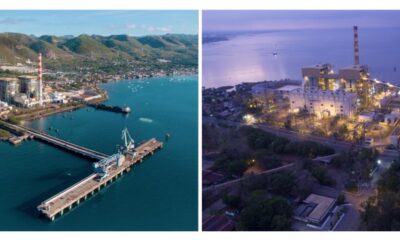Business
Globe Announces Full Year 2018 Results
Globe spent P43.3 billion or about $821 million capital expenditures (capex) in 2018 to address the robust data traffic growth and support its increasing customer base with the ramped-up LTE rollout. About 77% of the total capex for 2018 was for data-related services, all geared to meet the customer demand for more bandwidth-intensive content. In line with the Company’s continued expansion and enhancement of its data network, full year 2019 cash capex is expected to reach P63.0 billion or approximately $1.2 billion.
Mobile subscriber base totaled 74.1 million as of end-December 2018, which will now become the new baseline given the impact of the regulatory requirement which extends prepaid load1 validity to one (1) year regardless of amount.
Total home broadband subscriber base grew 24% from last year and now stands at over 1.6 million, of which around 61% are home wireless subscribers.
On a post-PFRS basis, Globe ended the year with consolidated service revenues of P132.9 billion. Excluding the impact of the PFRS 15 adjustments, total consolidated service revenues posted P140.2 billion, up 10% year-on-year. The continued strong revenue performance was once again driven by data-related services across all business segments. This was likewise supported by Globe’s pervasive 4G/LTE network, and the wide array of content offerings, through its partnerships with industry leaders and global content brands.
As of end-December of 2018, mobile revenues grew to P99.5 billion on a post-PFRS basis, while pre-PFRS revenues registered at P106.9 billion, up 9% from a year ago. From a product perspective, mobile data revenues reached P50.8 billion in 2018 on a post-PFRS basis, while pre-PFRS mobile data revenues were higher by 28% versus the P43.1 billion reported in 2017. Mobile data continued to be the top contributor to the Company’s mobile business, and now accounts for 51% of gross mobile service revenues from 44% a year ago. This was propelled by the sustained higher prepaid top-ups, with more consumer spending on mobile data, thus driving the mobile data traffic growth from 600 petabytes last year to 956 petabytes in 2018. Meanwhile, mobile voice and mobile SMS revenues on a post-PFRS basis as of end-December 2018, stood at P28.5 billion and P20.2 billion, respectively. Excluding the impact of the PFRS 15 adjustments, mobile voice revenues posted P30.3 billion, or down 6% year-on-year while mobile SMS revenues totaled P21.3 billion, or lower by 8% versus 2017.
Globe’s home broadband business ended the year with total revenues of P18.6 billion on a post-PFRS basis, due mainly to the continued subscriber expansion in fixed wireless solutions, in particular the growing popularity of the Home Prepaid Wifi product. On a pre-PFRS basis, home broadband revenues reached P18.5 billion, or up 19% versus a year ago.
On a post-PFRS basis, corporate data business totaled P11.8 billion in revenues in 2018, largely attributed to a higher circuit base. Excluding the impact of PFRS 15 adjustments, corporate data revenues remained at P11.8 billion or a 15% increase year-on-year, given the increasing demand for fast, reliable and secure internet connectivity, as well as modern business solutions, that help enterprise clients to advance their businesses.
On a post-PFRS basis, Globe’s total operating expenses and subsidy amounted to P67.7 billion for the period, leading to consolidated EBITDA ending at P65.1 billion, with an EBITDA margin of 49%. Net income closed at P18.6 billion, primarily from the gains in EBITDA, offsetting depreciation charges and non-operating expenses booked for the year just ended. Depreciation expenses increased due to Globe’s continued capex investments. Core net income, which excludes the impact of non-recurring charges, and foreign exchange and mark-to-market charges, ended at P18.7 billion.
Excluding the impact of the PFRS adjustments, EBITDA stood at P64.9 billion, 22% higher than last year, with EBITDA margin at 46% (vs. 42% in 2017). Net income for the period amounted to P18.4 billion, with core net income ending at P18.6 billion.
Commenting on these results, Ernest L. Cu, President and CEO of Globe Telecom Inc., said:
“We are proud of what we have achieved in 2018 both in terms of financials and network expansion. With our unwavering commitment to bring the Philippines closer to first-world internet connectivity, we are happy to announce that we have successfully met our minimum broadband coverage commitment. We will continue to build our network capacities to improve the internet experience as we re-invest our gains back to our network, which is now close to 33% of our revenues, to be able to deliver a differentiated level of customer service.”
In compliance with the directive of the National Telecommunications Commission (NTC), all telephone numbers of Globe customers in Greater Metro Manila (MM) with 02 area code will move to an 8-digit format on March 18, 2019. This directive is to ensure there will be sufficient resource pool to cater to the rapid growth of landline customers in major cities. The commission assigned a public telecommunications entity (PTE) identifier for telecom operators as an additional prefix in expanding from 7-digit to 8-digit landline number. The assigned PTE identifier for Globe and its subsidiary Innove is “7.” For instance, a Globe customer with existing landline or DUO number of (02) 576-4567 will have to change his or her number to (02) 7576-4567 come March 18, 2019. Meanwhile, Bayan Telecommunications customers will follow the numbering format (02) 3000-XXXX to (02) 3499-XXXX effective March 18, 2019.
Lastly, our Board of Directors approved in its meeting today, the declaration of the first quarter 2019 cash dividend of P22.75 per common share payable on March 13, 2019 to shareholders on record as of February 26, 2019. The first quarter cash dividend payment total is about P3.0 billion.
































